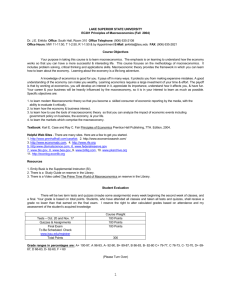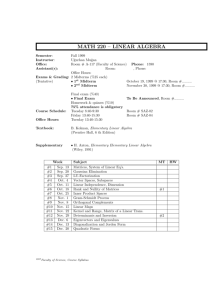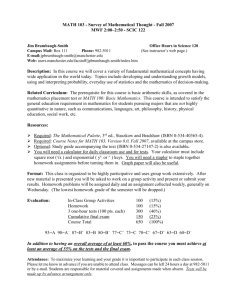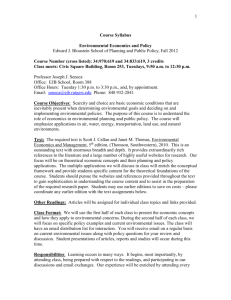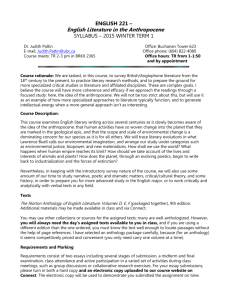Economics 303 Section 1
advertisement
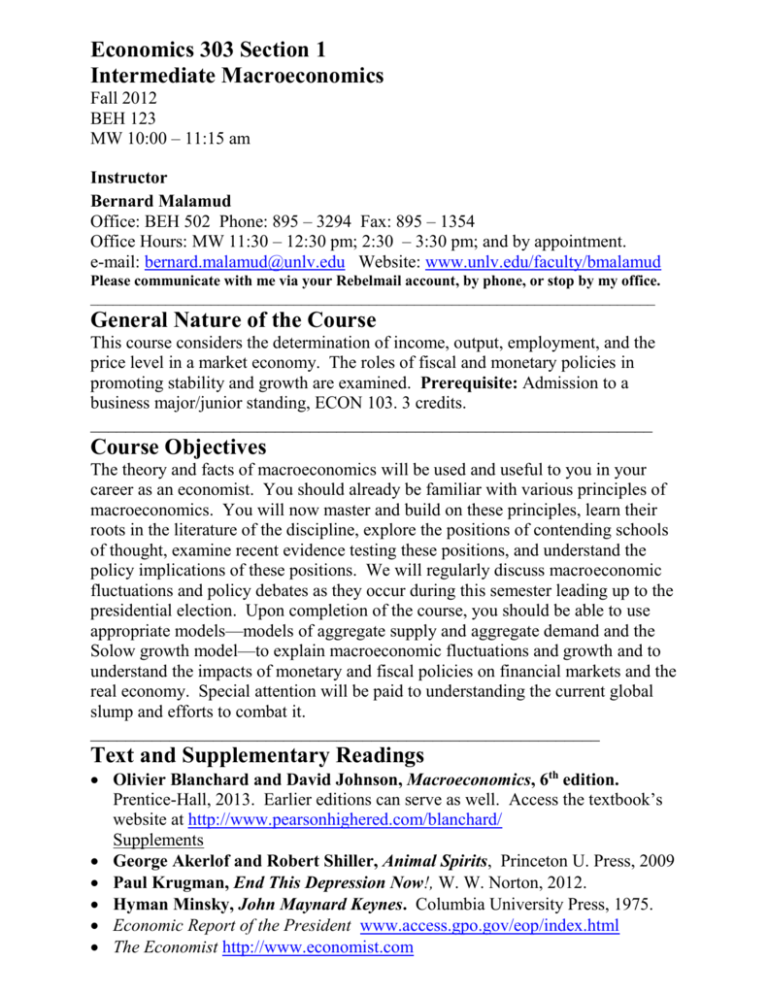
Economics 303 Section 1 Intermediate Macroeconomics Fall 2012 BEH 123 MW 10:00 – 11:15 am Instructor Bernard Malamud Office: BEH 502 Phone: 895 – 3294 Fax: 895 – 1354 Office Hours: MW 11:30 – 12:30 pm; 2:30 – 3:30 pm; and by appointment. e-mail: bernard.malamud@unlv.edu Website: www.unlv.edu/faculty/bmalamud Please communicate with me via your Rebelmail account, by phone, or stop by my office. ___________________________________________________________________________ General Nature of the Course This course considers the determination of income, output, employment, and the price level in a market economy. The roles of fiscal and monetary policies in promoting stability and growth are examined. Prerequisite: Admission to a business major/junior standing, ECON 103. 3 credits. ________________________________________________________________ Course Objectives The theory and facts of macroeconomics will be used and useful to you in your career as an economist. You should already be familiar with various principles of macroeconomics. You will now master and build on these principles, learn their roots in the literature of the discipline, explore the positions of contending schools of thought, examine recent evidence testing these positions, and understand the policy implications of these positions. We will regularly discuss macroeconomic fluctuations and policy debates as they occur during this semester leading up to the presidential election. Upon completion of the course, you should be able to use appropriate models—models of aggregate supply and aggregate demand and the Solow growth model—to explain macroeconomic fluctuations and growth and to understand the impacts of monetary and fiscal policies on financial markets and the real economy. Special attention will be paid to understanding the current global slump and efforts to combat it. __________________________________________________________ Text and Supplementary Readings Olivier Blanchard and David Johnson, Macroeconomics, 6th edition. Prentice-Hall, 2013. Earlier editions can serve as well. Access the textbook’s website at http://www.pearsonhighered.com/blanchard/ Supplements George Akerlof and Robert Shiller, Animal Spirits, Princeton U. Press, 2009 Paul Krugman, End This Depression Now!, W. W. Norton, 2012. Hyman Minsky, John Maynard Keynes. Columbia University Press, 1975. Economic Report of the President www.access.gpo.gov/eop/index.html The Economist http://www.economist.com Examinations and Grading Your grade will be based on a 40-point Principles of Macro “Final,” two 150-point classroom exams, a third 100 point classroom exam, and a 200-point comprehensive final examination. You will be able to re-do one question on each classroom exam at home; your score for that question will be the average of your classroom and take home scores. Attendance and class participation will affect your grade. Sep 24 Principles of Macro (ECON 103) Takehome “Final” due Oct 1 Classroom Exam, Chapters 1 – 5 Nov 5 Classroom Exam, Chapters 6 – 9 Nov 28 Classroom Exam, Chapters 10 – 13 Pop quizzes Dec 10 Final Examination, 10:10 am – 12:10 pm Maximum Total Points 40 points 150 150 100 ??? 200 640+ points Approximate Grade Distribution Average Score (out of 640+ points) 90 percent 80 percent 70 percent 60 percent Final Grade Borderline ABorderline BBorderline CBorderline D- Makeup Policy Makeup exams may be arranged at mutual convenience if you have a compelling reason to miss a scheduled classroom exam. A makeup exam must be taken before the missed exam is returned to the class. There will be no makeup final exam. However, a student missing a class because of observance of a religious holiday and students who represent UNLV at any official extracurricular activity shall also have the opportunity to make up assignments. Such students must provide official written notification no less than one week prior to the missed class(es). Class Conduct Your instructor and classmates deserve courtesy. If you must arrive late or leave early, do so quietly. Inform me beforehand if you must leave a class early. Smoking and eating in class are prohibited. Talking to your neighbors in class, reading newspapers and magazines, and texting on a cellphone is rude, disruptive, and unacceptable. While this probably need not be said, anyone found engaging in any act of academic dishonesty will be punished in accordance with UNLV policies. Other Information The Disability Resource Center (DRC) coordinates all academic accommodations for students with documented disabilities. The DRC is the official office to review and house disability documentation for students, and to provide them with an official Academic Accommodation Plan to present to the faculty if an accommodation is warranted. Faculty should not provide students accommodations without being in receipt of this plan. UNLV complies with the provisions set forth in Section 504 of the Rehabilitation Act of 1973 and the Americans with Disabilities Act of 1990, offering reasonable accommodations to qualified students with documented disabilities. If you have a documented disability that may require accommodations, you will need to contact the DRC for the coordination of services. The DRC is located in the Student Services Complex (SSC), Room 137, and the contact numbers are: VOICE (702) 895-0866, TTY (702) 895-0652, FAX (702) 895-0651. For additional information, please visit: <http://studentlife.unlv.edu/disability/>. Course Outline Topic, Discussion Problems (End of Chapter) Dates Do each “discussion problem” shown in parenthesis (Chapter – Problem Number(s)) before class. Treat it like homework. While it will not be collected, you will be expected to participate in its discussion. Aug 27,29 Course Organization Tour of the World: What’s Up? What’s Not? (1 – 1,6) Tour of the Book: Macro-Talk (2 – 4,5,6,9) Principles of Macro Redux Sep 3 Labor Day Recess Sep 5,10 The Core: Short-run The Goods Market: Z = C + I + G + X – Q (3 – 2,3,5,6) Problems: Chapters 1,2,3 Reading In Texts Chapter 1 Chapter 2 Review your Principles text Chapter 3 Sep 12,17 Financial Markets: Md, Ms, i (4 – 2,6) Problems: Chapter 4 Chapter 4 Sep 19,24 Goods and Financial Markets: IS - LM Policy Exercises and Dynamics (5 – 4) Problems Chapter 5 Chapter 5 Sep 24 Principles of Macroeconomics Takehome “Final” Due Sep 26 Catch-up and Review Oct 1 Classroom Examination, Chapters 1 – 5 (150 pts) Oct 3,8 The Core: Medium-run The Labor Market: Wages, Prices, and the “Natural Rate” (6 – 3) Problem: Chapter 6 Chapter 6 Oct 10,15 Putting It Together: AS – AD and Policy (7 – 3, 5,6) Problems: Chapter 7 Chapter 7 Oct 17,22 The Phillips Curve: Incarnations and Elaboration (8 – 3, 5) Problems: Chapter 8 Chapter 8 Oct 24,29 The Crisis Expansion, Fragility, Collapse, Bailout, Liquidity Trap Problems: Chapter 9 Oct 31 Catch-up and Review Nov 5 Classroom Examination, Chapters 6 – 9 (150 pts) Chapter 9 (Ch 28 in 5th ed. update) Course Outline (continued) Topic, Discussion Problems (End of Chapter) Reading In Text Nov 7 The Core: Long-run The Facts of Growth Chapter 10 Nov 12 Veterans Day Recess Nov 14,19 Saving, Accumulation, and Output (11 – 5,8) Chapter 11 Nov 21 Technological Progress and Growth (12 – 7) Chapter 12 pp.248-254 Chapter 13 pp.271-276 Dates Progress, Wages, and Unemployment (13 –2) Nov 26 Problems, Chapters 11-13 Nov 28 Classroom Examination, Chapters10 – 13 (100 pts) Dec 3 The Story of Macroeconomics Dec 5 Catch-up and Review Dec 10 Final Examination 10:10 am – 12:10 pm (200 pts) Chapter 25 (Ch 27 in 5ed Update)
